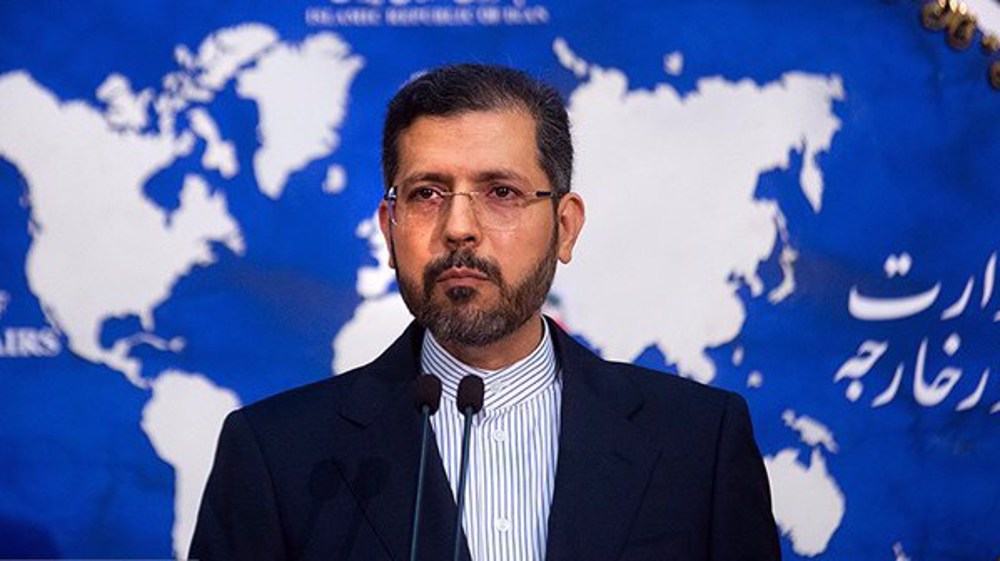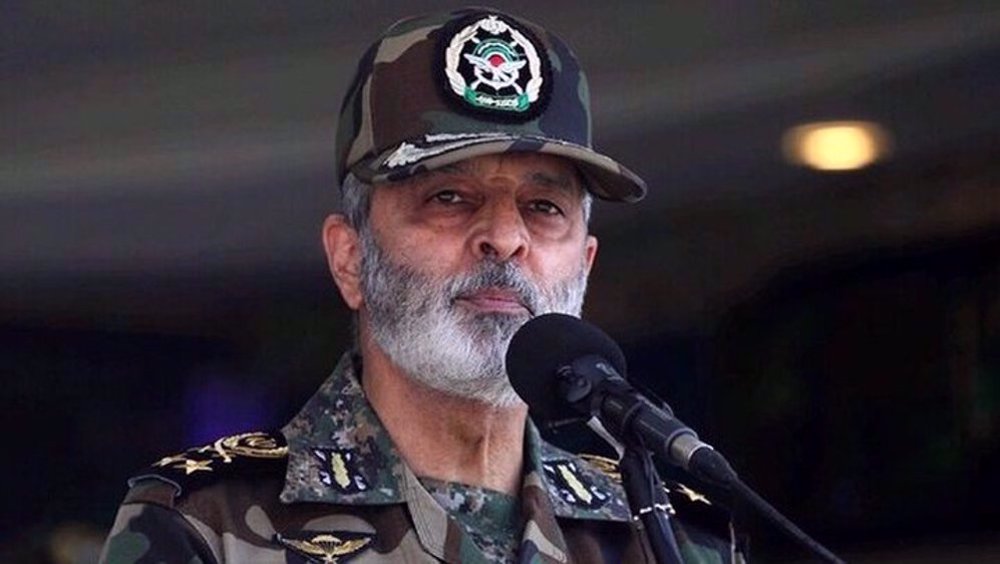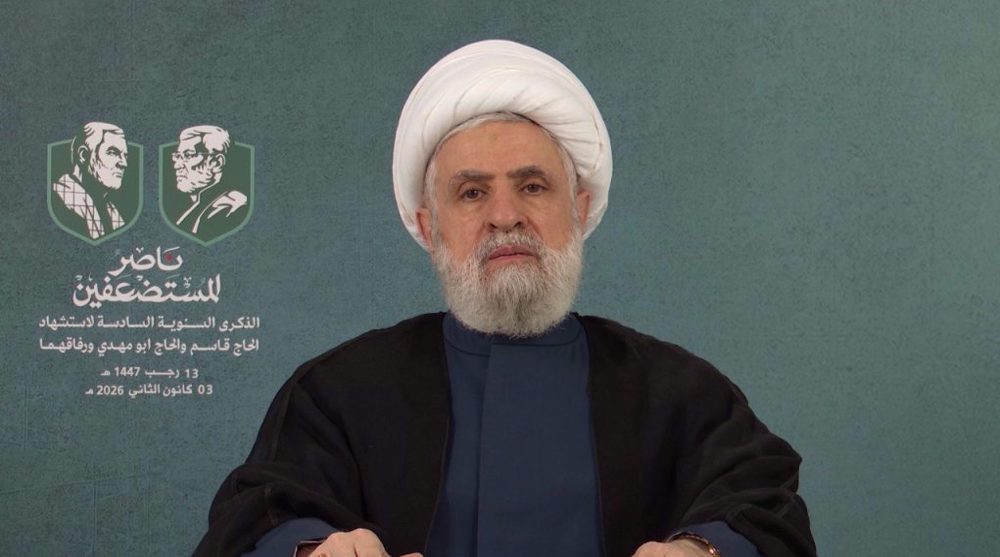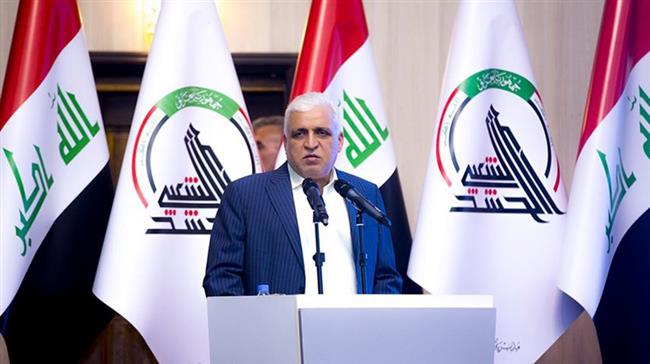US sanctioned Iraqi anti-terror leader out of distress: Iran
Iran says the United States imposed sanctions against the head of a prominent anti-terror force in Iraq out of the distress that it has been suffering since the Iraqi parliament mandated the withdrawal of US forces.
“It is clear that measures of this type indicate the very unfavorable situation of the United States in the West Asia region,” Foreign Ministry spokesman Saeed Khatibzadeh told a weekly press briefing in Tehran on Monday.
“In Iraq, they (the Americans) are very distressed and fearful about the parliamentary ratification,” he added.
The US took the measure against Falih al-Fayyadh, a former Iraqi national security adviser and current chairman of the Popular Mobilization Units (PMU) better known as Hashd al-Sha’abi, on Saturday. The US Treasury Department accused the 64-year-old of being responsible for a crackdown on anti-government demonstrations in Iraq in late 2019.
Khatibzadeh, however, said such a step by Washington against the head of a purely governmental organization is not only condemnable, but also doomed to failure.
“This is a very tedious application of a method that has lost its creditworthiness,” he said, referring to Washington’s sanctions spree.
The Iraqi legislative body passed the law early last year after the US assassination in Baghdad of senior Iranian and Iraqi anti-terror commanders, Lieutenant General Qassem Soleimani and Abu Mahdi al-Muhandis. The latter served as the PMU’s second-in-command.
The spokesman also pointed to reports about the US intention to impose similar measures against Yemen’s Houthi Ansarullah popular movement.
The group has been defending the Arab world’s poorest nation against a Saudi war and blockade since 2015 that is backed by the US. The war has killed hundreds of thousands of Yemenis and left Yemen in throes of the world’s worst humanitarian crisis.
“All these would not have happened if the US had not given Saudi and its allies a blank check,” Khatibzadeh said, referring to the US’s financial and political support for the inhumane warfare.
“After many years of bombarding Yemen, they have stooped so low as to try to hide their inabilities behind such abortive actions,” the official said.
The US, Khatibzadeh said, will eventually have to respect the realities on the ground in the region.
“Sooner or later, they will be forced to enter negotiation with such domestic and responsible groups, including in Yemen.”
Innocent blood haunting US
The spokesperson also addressed a recent raid on the US Capitol by Donald Trump’s supporters, saying it further damaged the outgoing president's tarnished image.
“The most shameful administration in the US is being expelled from the White House in the most shameful way,” Khatibzadeh said.
The very command center that ordered the insurrection against the US democracy had also mandated the US’s economic war on the Iranian nation and General Soleimani’s assassination, Khatibzadeh said.
Washington “will have to be accountable one day for the blood that it has shed unjustly in Afghanistan, Yemen, Iraq, and the [Middle East] region as well as in Latin America, the Far East, and inside the United States,” he added.
Iran never politicizes issue of COVID vaccine
The official also pointed to Iran’s refusal to buy Western vaccines and its decision to domestically develop its own medication for COVID-19 in cooperation with other countries.
Leader of the Islamic Revolution Ayatollah Seyyed Ali Khamenei has prohibited purchases of American and British vaccines amid reports about their potential harmful effects, and scientific publications casting doubt on the “mRNA method” based on which the vaccines have been produced.
Khatibzadeh said the Islamic Republic has never politicized the issue of medication but the West has been trying “heinously” to gain political mileage out of it by complicating Iran’s access to the vaccine through either sanctions or preventing the country from paying for it.
“Since day one, we knew how the Americans and some European countries would refuse to help us. So, we chose other vaccines,” he said.
Korean vessel’s case strictly technical
The spokesman was also asked about the issue of a South Korean fuel tanker that has been impounded by Iran for repeated environmental violations.
He said the vessel was seized for polluting the marine ecosystem in the Persian Gulf with prior warning.
Foreign reports have tried to accuse the Islamic Republic of holding the ship to force Seoul to release $7 billion in oil revenues that it owes Tehran.
“Those who are after politicizing the issue are down a wrong course,” Khatibzadeh said. “We are duty-bound to protect the marine ecosystem.”
"Attempts at politicizing the issue will not contribute to its technical resolution,” the official said, stating that parties affected by Iran's move are free to follow the case through legal channels.
Venezuelan military stands with acting president after US kidnapping of Maduro
VIDEO | Press TV's news headlines
VIDEO | Protesters in Toronto slam US kidnapping of Venezuelan president
Israeli troops detain, intimidate Palestinian toddler in West Bank
Iran says its investments in Venezuela face no major risk
Make ‘right decision’ or face more US pressure, Rubio tells Venezuela’s Rodriguez
VIDEO | General Soleimani honored in Kashmir, Kargil
US, Israel waging ‘soft warfare’ to destabilize Iran after June defeat: Top general



















 This makes it easy to access the Press TV website
This makes it easy to access the Press TV website